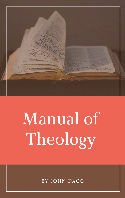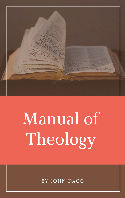Webmaster
Webmaster: [email protected]
We would like to give a shout-out to our friends at www.monergism.com
Donations: donate to help support this website.
Site Statistics
Total Files for Download: 2067
Total downloads: 4096820Categories
Upcoming Posts
- Collection of docx Sat 2/28/26
- Flavel, John-A Token for Mourners Thu 3/5/26
- Baxter A Call to the Unconverted Fri 3/6/26
- Dods Expositor’s Bible Genesis Sat 3/7/26
- Chadwick Expositor’s Bible Exodus Sun 3/8/26
- Numbers-People, Places and Things Sun 3/8/26
- Horton Expositor’s Bible Proverbs Mon 3/9/26
- Kellogg Samuel Expositor’s Bible Leviticus Tue 3/10/26
Recommended Browser Extension
I recommend Bible Preview browser Extension.
Sidebar Advertisements

The Problem with Communists examines how Communism works. Resistance against government is insurrection. Governments have God-given duties and obligations which they must do.
Table of Contents
1. Petro's Recent Statements
Colombia's Gustavo Petro goes off the rails Jesus made love, I am unforgettable in bed
2. A Communist Champions Revolution and Insurrection
3. Insurrection is a Sin against God
4. Minnesota Riots against ICE and Immigration Law
5. "Nobody is above the Law"
6. What to do with Communist Governments?
7. Popular opinion has no place
Read News Article: The Problem with Communists.Site Archives
These pages are archives of the downloads added to this site, organized by year and month. (Download links included)
2024 12Dec.
More Good Posts
David Cox Internet Ministries

David Cox Internet Ministries This post is an update on how our Internet Ministries are moving along, or our reach to the world. It contains some statics for the last 30 days before September 14th, 2023. If you are interested in knowing about our outreach via our Internet websites, please visit this page.
Read the article-
Recent Posts
Donate
Google Ads
Buy me a Cup of Coffee

What's Wrong with the Democrat Party?
I look at very deep problems within the Democrat Party and their operatives and elected officials. Let me begin by saying I am Republican, but my opinions and views still count. They are worthy of listening to and evaluating to see if you see these same problems within the Democrats.
Read the Article: What's Wrong with the Democrat Party?Free Books

Dagg Manual of Theology (and links to this work in various other formats).
Dagg Manual of Theology (MySword for Android)
Dagg Manual of Theology (theWord Bible Format)
Dagg Manual of Theology (esword format)
Dagg Manual of Theology (PDF Format)
Good Books and Tracts

pc06 Suicide or something worse? We look at the causes of depression leading into suicide, and help from God and the Bible.
Excerpts: In Mark 5.2-5 there is a demon possessed person who day and night “cut himself with rocks.” In Matthew 17:15 we also see another demon working which seeks to force the person to commit suicide. The desire to harm yourself is a force of darkness, not from God. But the solution then is only found in God, in His love for you, and in His salvation. We should cast our cares upon Him, “for he careth for you” (1 Peter 5:7). By building a strong relationship with God we can get out of our problems. God will also give us strength and endurance through our problems. The only place of true happiness and joy is when one is in the will of God.
Topics: What causes a person to think about suicide? | What is depression? | Who is the King and Owner of your Life? | What is suicide? | How do I avoid ideas of suicide?
pc06 Suicide or something worse?.


Cox Expositor’s Bible Book of Ecclesiastes
PREFACE.
The Lectures on which this book is founded were delivered five-and-twenty years ago, and were published in A.D. 1867.[1] For more than twenty years the book has been out of print, a large first edition having been speedily sold out. No other edition was issued owing to the fact that my publisher soon passed into another profession. I have often been asked to reprint it, but have always felt that, before reprinting, I must rewrite it. Till of late, however, I could not command leisure for the task. But when, at the commencement of this year, the Editor of The Expositor’s Bible did me the honour to ask permission to reprint it, that he might include it in this excellent series, I had leisure at command, and cheerfully devoted it to the revision of my work. Among the more recent commentaries I have read with this purpose in view, those which[vi] I have found most helpful and suggestive were that of Delitzsch, that by Dr. Wright, that of Dean Plumptre, and the fine fragment contributed to The Expositor by Dr. Perowne, the Dean of Peterborough.
In the preface to the former edition I dwelt on my indebtedness to the commentary of Dr. Ginsburg, published in A.D. 1861. In my judgment it still remains by far the best, the most thorough and the most sound. It has but one serious defect; it is addressed to scholars, and so abounds in learning and erudition that it can never come into popular use. Indeed even now, although during the last twenty years there has been an immense advance in the study and exposition of Holy Writ, and many able and learned men have devoted themselves to the service of the general public, I know of no commentary on this Scripture which really meets the wants of the unlettered. I cannot but hope, therefore, that the Quest of the Chief Good may still serve a useful purpose, and that, in its revised form, it may be found helpful to those who most need help.
In rewriting the book I have retained as much as I could of its earlier form, lest the vivacity of a first exposition of the Scripture should be lost. And, indeed, the alterations I have had to make are but[vii] slight for the most part, though I have in many places altered, and, I hope, amended both the translation and the commentary: but there are one or two additions—they will be found on pages 20-26, and, again, in certain modifications of the exposition of Chapter XII., verses 9-12, on pages 279-305; dealing mainly with the structure of Ecclesiastes—which may, I trust, be found useful not to the general reader alone. Since the original edition appeared I have had to study the Book of Job, most of the Psalms, many of the Prophetical writings, and some of the Proverbs; and it was inevitable that in the course of these pleasant studies I should arrive at clearer and more definite conceptions on the structure of Hebrew poetry. These I now place at the service of my readers, and submit to the judgment of scholars and critics.
Another and much more important result of these subsequent studies has been that I can now speak with a more assured confidence of the theme of this Scripture, and of its handling by the Author. None of the scholars who have recently commented on the Book doubt that it is the quest of the chief good which it sets forth; and though some of them arrange and divide it differently, yet, on the whole and in the main, they are agreed that this quest is[viii] urged in Wisdom, in Pleasure, in Devotion to Public Affairs, in Wealth and in the Golden Mean; and that it ends and rests in the large noble conclusion, that only as men reverence God, and keep his commandments, and trust in his love, do they touch their true ideal, and find a good that will satisfy and sustain them under all changes, even to the last. The assent to this view of the Book was by no means general a quarter of a century ago; but it is so wide now, and is sanctioned by the authority of so many schools of learning, that I think no reader of the following pages need be disturbed by misgivings as to the accuracy of the main lines of thought here set forth.
Few Scriptures of the Old Testament are so familiar to the general reader as Ecclesiastes; and that mainly, I think, because it addresses itself to a problem which is “yours, mine, every man’s.” Many more quotations from it have entered into our current speech than have been taken from Job, for example, although Job is both a much larger and a much finer poem than this—”the finest poem,” as a great living poet has said, “whether of the modern or of the antique world.” It is a Book which can never lose its interest for men until the last conflict in the long strife of doubt has led in[ix] the final victory of faith; and seems, in especial, to adapt itself to the conditions and wants of the present age. It deals with the very questions which are in all our minds, and offers a solution of them, and, so far as I know, the only solution, in which those who have “eternity in their hearts” can rest. May all who study it, with such help as the following pages afford, find rest to their souls, and be drawn from the heat and strife of thought into the calm and hallowed sanctuary which it throws open to our erring feet.
The Holme, Hastings,
October 1890.
Works from this Category